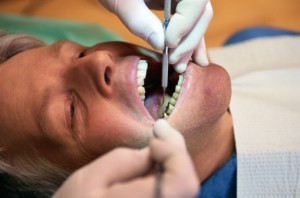Dental Care and Cancer Treatment
Prevent infection during cancer treatments with expert dental care

- Mouth sores
- Infection
- Dry mouth
- Sensitive gums
- Jaw pain
In some cases, the oral infection can be serious enough to delay further cancer treatments. This makes it extremely important to take excellent care of your dental health before, during, and after cancer treatment.
Implement this Cancer Action Plan with your Dentist’s Help
1. Before Treatment: Get a Dental Checkup
Because cancer—and various cancer treatments—weaken your immune system, it is extremely important to have any oral infections under control before beginning treatment. As a first step, you can visit your dentist for a cleaning and exam. If issues such as gum disease, severe tooth decay, or infected teeth are discovered, your dentist can then recommend the appropriate treatment. For example, you might need a deep cleaning to address severe gum disease or a root canal to remove infected tooth roots.
Your dentist can also provide advice about oral hygiene including proper brushing and flossing technique that will help control populations of oral bacteria and prevent gum disease or other infections from recurring.
2. During Treatment: Treat Your Side Effects
If you do develop oral health side effects during treatment, your dentist can help you address them. From a tooth health perspective, one of the most important side effects to address is dry mouth. Saliva is normally very important for washing away food and bacteria and keeping teeth safe from decay, so if you develop dry mouth you will be at increased risk for tooth decay. One way to deal with dry mouth is to chew sugar free gum to stimulate saliva production. Another option is to ask your dentist and/or doctor about using artificial saliva or a fluoride rinse to help protect your teeth.
3. After Treatment: Continue with Routine Dental Care
After your cancer treatment is complete, your immune system should recover and you will no longer be at increased risk for infection. However, this does not mean the risk is gone completely. You will obviously still want to keep up with your routine dental visits including annual cleanings and exams. If you have had issues with gum disease, you may want to visit the dentist more frequently for deep cleaning treatments that will prevent your symptoms from becoming severe and contributing to tooth loss.




